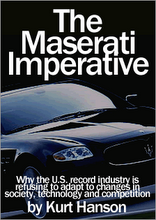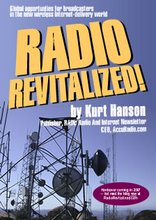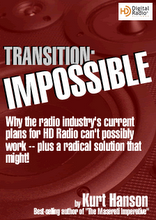Tuesday, June 5, 2007
Lala's plan sounds lulu!
But the plan sounds, if I'm understanding it correctly -- how can I put this politely? -- mind-numbingly ludicrous!
First, the paper's Ethan Smith reports that Lala is paying major labels $6 to $8 per month per user -- "about the same wholesale rate paid by online music-subscription services like Rhapsody." There's no way... NO WAY!... Lala could make that much money in profit from download sales.
(Wait -- the AP's story on the same topic says that Lala is paying the labels a penny per song for on-demand plays. That's much more reasonable. (But, actually, that seems crazy-low for the labels -- why should I pay $12.99 retail for the new Bright Eyes album if, over the next few weeks, I can punch up the hit song a dozen times and the other songs five times each via an on-demand service? The label would lose their share of the $12.99 in exchange for only making $.62 . But I digress.) (But who's right? The Wall Street Journal or the Associated Press? One of the two reporters probably missed a "which works out to..." qualifier.)
(But could Lala make money at even the AP's "penny per song"? For selling album downloads, Lala would get to keep, what, 15% of the purchase price -- maybe $1.50? So at a penny per streamed song, streaming 20 songs per hour, they'd need a consumer to buy an album for every 7.5 hours of listening! Impossible!)
Second, the article says that Lala users, online, can listen to other users' iTunes playlists, all for free. Wait, okay I'm fine with that one; if the $6-8/month or the penny per track is paid, that's a kind of trivial bonus feature...
Third (back on track), "Lala gets around the copy-protection issue" of downloading music into an iPod by using a plug-in that puts the tracks directly onto the iPod, where they can never be moved! At $6.50 to $13.50 per album! Ludicrous!
Fourth, it's supposed to be appealing because you can download through a web browser without using the iTunes software. And the benefit to that is...?
Fifth, "Lala found Bill Nguyen...calls the Lala gambit an 'all-in' proposition, readily acknowledging that if it if fails, his company will most likely go under." Has he ever heard of market research or user testing?
Sixth, the final paragraph says that Lala already features an Internet radio service that "with their characteristically gung-ho spirit" (suck up much?) they built from scratch, spending weeks to rip 100,000 CDs bought just for the occasion. Nonsensical -- you can build hundreds of great channels of music with a fraction of that many CDs. Furthermore, if this actually exists, why can't I find it on the site?
Red flag: "After the installation has finished, lala.com will scan your computer for your music and upload the music to lala.com for access from any computer in the world. " (Is it actually uploading the music files? If Lala already has ripped 100,000 CDs, why does it need your copies? (This is like when Spock's half-brother tried to commandeer the Enterprise in "Star Trek V," allegedly on behalf of God, and Kirk asked, "Why does God need a starship?"))
===========
Remember, Lala until now has been a glorified used CD store, without even the pretense that buyers might want to own the CD. In the previous scheme, users paid Lala $1 to get CDs (via a Netflix-like prepaid-envelope mechnism) they could rip to their PCs. Lala presented this as "artist-friendly" because they voluntarily donated a portion of that dollar to some artist-friendly cause. (It makes no sense to me that record industry would on the one hand be trying to enact legislation to kill used CD stores (http://stereophile.com/news/050707resale/) yet on the other hand, at the same time, get into bed with Lala.)
Wednesday, May 23, 2007
"I'm Gonna Sit Right Down and Write Myself a Letter"
Well, that's the feeling I got yesterday when I read the five-page letter from Representatives Howard Berman (D-CA) and Howard Coble (R-NC) to SoundExchange Executive Director John Simson:
Something doesn't seem right about it.
"Tell me something I don't already know"
Previously, what had caught my eye was this: Included in Monday's SoundExchange press release on the topic was the following sentence attributed to Berman and Coble:
"In return for compelling sound recording copyright owners to make their works available, the qualifying services agree to meet the terms and conditions of the compulsory license, which, inter alia, requires the periodic filing of statements of account and the timely payment of statutory royalties."First, who writes like that? (Well, lawyers, obviously, but still.)
Second, why would Berman and Coble feel obligated to tell John Simson something like this that he obviously already knows?
The only answer I could come up with is that SoundExchange wanted Berman and Coble to make that point... so they could use the quote in their press release.
But wait, there's more!
Later in the week, I was able to obtain a copy of the Berman-Coble letter, as SoundExchange apparently distributed copies to some journalists.
And it got weireder: The Berman-Coble letter is actually a five-page letter encouraging Simson to "immediately initiate good faith private negotiations with small commercial and noncommercial webcasters."
But rather than being an admonishment to do so, Berman and Coble actually spend the vast majority of the letter selling Simson on the reasons that the CRB process was fair and the judges' decision was good.
And the salesmanship is strong! Here's a choice quote:
"The CRB's final rule provides annual adjustments in the royalty rate for commercial webcasters. Over time, these adjustments would result in a graduated increase from .0008 cents per performance in 2006, which amounts to less than a 5% increase from 2005 to 2006, (emphasis added) to .0019 cents per performance in 2010."What the...?! If two key members of the House Judiciary committee are writing a representative of copyright owners to ask him to negotiate a lower rate for certain classes of webcasters, why would they spend valuable time and effort writing about how low the existing rates are?
And why would they play up, in a letter to Simson, the one data point he's been using himself for the past two months?
(Note that Simson never mentions the 38%, 27%, and 29% increases in each of the next three years. Nor, coincidentally(?), did Berman and Coble to him.)
Applying Occam's razor
"Occam's razor" says that the simplest explanation is probably correct. So let's try that approach.
Let's imagine for a moment that SoundExchange was feeling the pressure of growing support for the Internet Radio Equality Act -- Congress beseiged by e-mails, faxes, and phone calls from webcasters, musicians, and listeners; dozens of co-sponsors signing up for the bill; the NAB throwing in their support on Friday -- and that they wanted to derail its momentum.
One optimal way of doing it might be to cut a deal with the two classes of webcasters that you believe are getting the most sympathy from journalists and driving much of the pressure from constituents, yet comprise only a tiny portion of royalty payments you receive: Small webcasters and non-comms.
And what better way to present that plan than to say it was "at the request of Congress" (even though it was technically only at the request of two Congressmen who, based on their past voting history, likely would have OPPOSED the Internet Radio Equality Act)?
And better yet, what if the request "from Congress" was a five-page letter filled with every point you wanted made in support of the CRB decision? Score!
"Sign here, please"
To me, that's the only explanation that makes any sense.
Let's assume, reasonably, that Berman and Coble's staffs have good relationships with the RIAA and SoundExchange. Suppose someone at the RIAA or SoundExchange drafted a letter (A) defending the wonderfulness of the CRB decision and (B) asking SoundExchange to negotiate with the two minor subgroups of webcasters that SoundExchange wanted to negotiate with.
So Berman and Coble affix their signatures. Then, almost simultaneously, SoundExchange has (A) an "confidential" offer letter drafted to small webcasters (although the "offer" is missing key terms; like if I "offered" to buy your used car but said we'd work out the price later) and (B) a press release that goes out five minutes after the "confidential" "offer" is delivered to the small webcasters.
It's the only explanation that I believe explains the content and tone of the Berman-Coble letter.
Nonetheless, a step in the right direction
Obviously, if SoundExchange is starting to "value the diversity of programming offered by webcasters" (as "Berman" and "Coble" wrote) and is willing to offer interim royalty rates that help some webcasters avoid bankruptcy, that's good.
And if SoundExchange feels they need the cover of characterizing it as "responding to a request from Congress"?
Well, whatever. You do what you gotta do.
Monday, May 21, 2007
CRB performance royalty would DESTROY broadcast radio
The Los Angeles Times, considered by some to be the major-newspaper mouthpiece for the entertainment industry (for example, I remember when it published a positive review of the big-budget Matthew Broderick/Hank Azaria "Godzilla" movie!), gave a largely positive spin today (here) on the story that "with CD sales tumbling, record companies and musicians are looking at a new potential pot of money: royalties from broadcast radio stations."
One choice quote:
"Mary Wilson... [one of the] original Supremes, said the exemption was unfair and forced older musicians to continue touring to pay their bills."After so many years of not being compensated, it would be nice now at this late date to at least start,' the 63-year-old Las Vegas resident said in Milwaukee, where she was performing at the Potawatomi Bingo Casino. 'They've gotten 50-some years of free play. Now maybe it's time to pay up.'"
Another interesting, uncontested quote was:
"'The creation of music is suffering because of declining sales,' said RIAA Chief Executive Mitch Bainwol."
Since proof of this concept -- that the creation of music is suffering -- would be critical to revising copyright law in the actual spirit of copyright law, it would be interesting to see if there is any factual support for this assertion. (But let's save that for later.)
Let's do the math
What I thought I'd do today is take a look at what would happen to the terrestrial radio industry if it had to pay a performance royalty similar to the CRB rate for 2007 that webcasters are currently faced with.The math is actually pretty simple:
- Radio is a $20 billion business.
. - What's the audience size? Of America's 250 million 12+ population, at the average moment (Mon-Sun 6AM-Mid), about 14% of the population is listening to the radio. So, 250 mil x .14 = 35 million radio AQH (i.e., average audience).
. - How many songs is that? Let's assume about 67% of that listening is to music-based radio stations, playing about 12 songs per hour, 18 hours per day (6AM-Mid), 365 days per year. Then add an extra 10% to account for songs played overnight (Mid-6AM). 35 million x .67 x 12 x 18 x 365 x 1.10 = 2,033,677,800,000 song performances per year. (Important note: Every one of those over 2 trillion song performances is a 3-minute-long promotion for buying it (assuming it's made available and priced reasonably by the label).) *
. - What's the potential royalty obligation? Multiply the 2007 CRB rate of $.0011 per performance by a bit over 2 trillion performances, and you get $2,237,045,580. Divide that figure by industry revenues of $20 billion, and you learn that this payment would comprise 11.2% of total industry revenues.
. - What does that do the radio industry? It destroys the entire profitability of the industry! Going alphabetically through some publicly-traded companies and their "net income": Beasley has about a 8% profit margin; Citadel, negative; Clear Channel, 10%; Cox Radio, 13%; Cumulus; negative; Emmis, negative; Entercom, 9%; RadioOne, 14%; Saga, 9%; Salem, 9%... On average, it appears that the industry average is less than 11.2%..
.
...Which means that a CRB-like royalty rate would DESTROY the radio industry, by eating up more than 100% of the entire industry's profits! (BTW, it gets worse later in this decade. The CRB rate goes up to $.0019 per performance, which, assuming radio's AQH and revenues stay about constant, would equate to about 19.3% of industry revenues.)
"A new potential pot of money" =
More cash for Mary Wilson?
By the way, if in fact the RIAA got a sound recordings performance royalty imposed on broadcast radio, and if somehow half of that royalty got promised to the recording artists (for which there are no guarantees right now; as far as I know, it's nothing that the copyright owners of sound recordings have proposed), and if the rate that got imposed was a CRB 2007-like rate of $2.2 billion, then former superstar artists like Mary Wilson might be looking at $100K per year ** in income.
But does anyone truly think that the lack of a broadcast performance royalty is what's preventing Mary from going into the studio and making new art? ***
That's the actual supposed intent of copyright law -- to encourage innovation and creation of new work!
========================================
FOOTNOTES:
* But is this true -- is it promotional? Well, ask yourself this: If the Supremes were to be taken off every oldies station in America, would sales of their CDs (including box sets) and digital tracks go up or down? Given the general truth of the principle "Out of sight, out of mind," I would assume they would go down. But we could check that! In New York, when the oldies stations WCBS-FM went away, did sales of doo-wop CDs go up? I can't imagine that they did. In Los Angeles, when listeners lost their FM country music station a year or so ago, did sales of country CDs go up? Seems improbable. (But it's checkable!)
** What's my math? Let's imagine there were $2.2 billion in royalty revenues to split up. And let's imagine that 50% would go to artists. About 2% of U.S. stations are oldies stations, about 1.333% of songs played on oldies stations are Supremes songs (i.e., about 8 titles on a 600-song playlist), and there were 3 members of the group. $2.2 billion x .5 x .02 x .01333 / 3 = $98K per year. (Of course, the Supremes were atypically popular; members of the Strawberry Alarm Clock would see much less.)
*** Ah, but one might argue, "This is to motivate the next generation of Mary Wilsons to record new music." But this argument also doesn't seem to make sense either: Are there any singer-songwriters out there who are deciding not to create music in 2007 because they're looking ahead to the year 2047 and finding the prospects for potential royalty payments to be insufficiently remunerative? (Plus which, the only way for a new artist today to potentially become beloved enough in America to have oldies that are receiving airplay in 2047 would be to have some hit albums now, and the best route to achieving that would be via airplay from a thriving radio industry, including Internet radio, with its wider variety of genres and its deeper and wider playlists -- which is in jeopardy due to royalty rates!)
Sunday, May 20, 2007
Radio needs research
NAB member broadcast groups are at risk of Congress legislating a $1 billion (or more!) a year transfer of their profits (and that's close to half of industry profits!) to the record industry if somehow the RIAA pushes through a sound recordings performance copyright for music played on terrestrial radio. (The $1 billion figure is assuming that Congress or the Copyright Office imposes a 5%-of-revenues royalty, which is in the ballpark of the rate that satellite radio is rumored to be paying.)
And if that happens, I hate to say it, but radio groups almost deserve it. Why? Because they've done nothing to demonstrate to the general public, to journalists, to musicians, to independent record labels, and, most importantly, to Congress that RADIO AIRPLAY IS PROMOTIONAL IN NATURE!
I've tried to do my bit. When small webcasters first launched a website, SaveTheStreams.org, to protest the CRB royalty rate decision, we added a petition that listeners could sign. I paid an extra few bucks out of my own pocket to add a brief user survey -- one closed-ended question ("Thanks to Internet radio, have your CD (or music download) purchases (1) gone up, (2) stayed the same, or (3) gone down?") and two open-ended questions ("Do you feel that the existence of Internet radio helps or hurts the music industry?" and "Any other comments?").
Over 62,000 people signed the petition, coming from a wide variety of different webcasters' sites, and the vast majority gave reasonably thoughtful and insightful answers to the open-ended questions.
You can look at some of their answers here. (By the way, you can replace the "1250" in the URL with any number between "1" and "1250"; each page will show you 50 signatures.):
http://www.ipetitions.com/petition/saveinternetradio/signatures-1250.html
Terrestrial radio needs to replace my question about "Internet radio" with, simply, "radio", and needs a more-rigourous research design. A good study might cost $100K. But there is $1 billion a year at stake! Jeez!
Radio needs to make the point that the lack of this particular royalty in the U.S. (as opposed to in other countries) was, yes, a "historical accident"... but that it's a historical accident that led to the U.S.'s record industry becoming the largest, most successful, and most profitable in the world!
THAT'S JUST A FIRST DRAFT. REVISION COMING SOON.
The Maserati Imperative
I believe that the root cause of the record industry's problems are a belief on the part of senior management that they have the RIGHT to have their glory years -- that shining period when all the factors were lining up in their favor, and sales volume, profitability, and executive perks were all at their peak -- extended INFINTELY into the future, regardless of changes in technology, consumer tastes, or
 competition for the entertainment dollar.
competition for the entertainment dollar.In other words, the record executive who was driving a Maserati in the '90s believes he has a right to continue to do so forever.
(By the way, I realize that a more-accurate car model would probably be something like a high-end Mercedes, but I don't know my Mercedes model numbers and, what's more, "The Maserati Imperative" would be a great book title, wouldn't it? (See illustration.))
DVDs are an increasingly better value relative to CDs
Here's the primary problem causing the decline in CD sales (in my opinion):
Other segments of the entertainment industry are aggressively competing on price in an attempt to grow their overall revenues. And if a consumer has got a somewhat limited budget for entertainment purchases, and other things are becoming better values than music, he or she is going to start spending less on music and more on other things. (D'oh!)
You may recall, quite a few years ago, when the movie studios realized that they would make a lot more money selling millions of DVDs at $20 than tens of thousands at $60.
That pricing strategy really, really worked! As a result, during the past few years, the street price-per-hour of VIDEO -- with high production values, and attractively packaged -- has come down to about $7 per hour of content in the case of movies (and as low as $3 per hour if you take into account bonus features) and, even more appealing as low as $1.50 per hour in the case of TV shows (see illustration).
Meanwhile, the record industry is obstinantly trying to hold to their traditional price-per-hour of about $20 per hour of content for mere AUDIO.
And why do they think that consumers will let them get away with this? The Maserati Imperative!

http://www.washingtonpost.com/wp-dyn/content/article/2007/04/17/AR2007041701869.html
Other factors
I'll expand on this point later, but let me insert a note here that CD burning has always been with us. Only back in my day, it was called "home taping." (Ah, the TDK SA-C90 cassette!)
This practice was (and probably still is) an excellent music-discovery medium, second perhaps only to radio. Taping friends' LPs is how I discovered Bruce Springsteen, Led Zeppelin, and many other acts that I later went on to spend lots of money on. For acts that you like, eventually you prefer to own an "official" copy, not something that lacks cover art and where you made the label using a Sharpie.
As it was, so it shall always be.
Deceptive bullsh*t
"CD sales have slumped 25 % since 2000, while webcasting audiences have grown dramatically." -- SoundExchange FAQ
As Penn & Teller (well, actually, Penn) would say, "Bullshi*t!" That's being presented as a causal relationship when they know full well that's not true!
It would be equally true to say "CD sales have slumped 25 % since 2000, while consumption of Starbucks Orange Mocha Frappuccinos has grown dramatically."
Logically, therefore, Congress should impose a tax on Orange Mocha Frappuccinos and give the money to the big four record labels!
"Hey, kids, collect the whole set!"
I believe the bloggers and anlaysts who believe that the era of the CD is over are wrong. Why? Because we live in a culture where people like owning things that they like.
Example: I've watched every episode of "30 Rock" this season at least twice, but when that boxed set of Season 1 gets released in September, I'll be at the front of the line to buy it so I can give it an honored place on my bookshelf full of box sets of my favorite TV shows' best seasons.
Technology creates opportunties, but opportunities get ignored
The technology industy has handed the record business a potentially amazingly wonderful lifeline: They're selling kids (and, not to mention, adults) MP3 music players that hold 20,000 songs!
Yet what is the record industry doing to take advantage of this opportunity? Nothing.
Let's do the math: The net price per track of music when purchased in the CD format -- with nice packaging, near-perfect fidelity, and no copy restrictions, and despite expensive physical distribution costs -- is about 90 cents. But for download sales -- with no packaging, reduced fidelity, and signficant copy restrictions, and NO physical distribution costs, they're trying to get 99 cents! (And apparently, given what we read about how Steve Jobs had to cajole them into that, they're not happy with that!)
And then they have the sheer, unmitigated gall to complain to Congress that they need legislative relief because download sales aren't growing fast enough to perfectly supplant CD sales declines!
Realize that their pricing scheme means it would cost a teenager $19,800 to fill up their MP3 player legally. But the execs who run labels intend to hold that price, no matter what is happening in the worlds of technology, society, or their competition (e.g., declining DVD prices)! Why? Because they feel they have the right to maintain the same pricing, sales volume, and profit margins as they had in their glory years. It's the Maserati Imperative!
Footnote: Yes, I'll admite there is a legal way for kids to fill their MP3 devices (as long as they're not iPods) -- the subscription plans offered as Napster-to-Go, Rhapsody-to-Go, etc. Two problems, though: (1) They are not consistent with the American desire for ownership of things (which is especially true for kids ("Kids, collect 'em!")). (2) To maintain your collection of tracks, you're looking at a commitment of $15/month for the rest of your life, so it's still a prospective $10,000 commitment if you want to go that route. In contrast, if you spend that same $15 on a CD this month instead, at least it's yours for the rest of your life.



